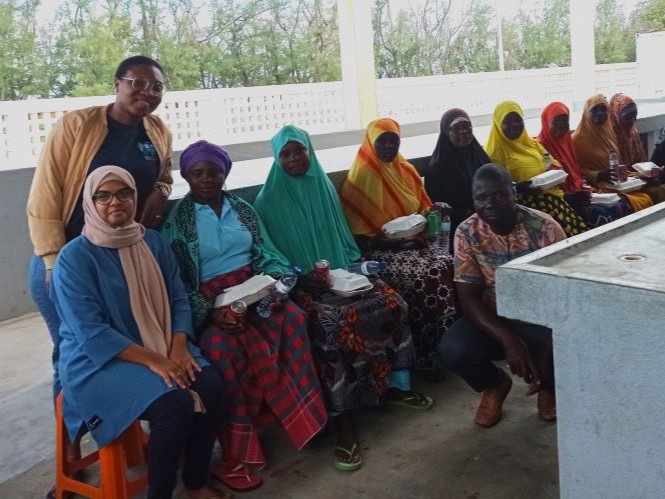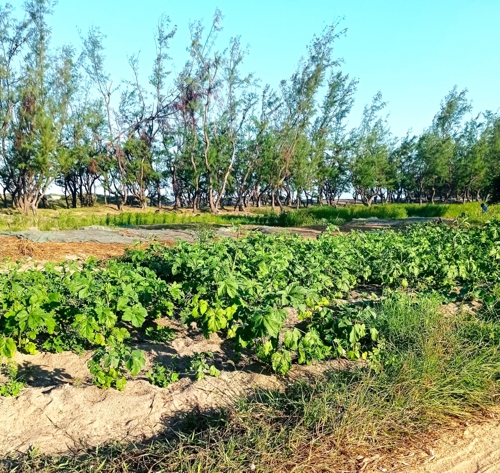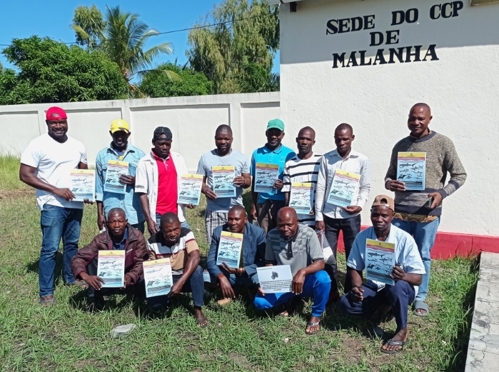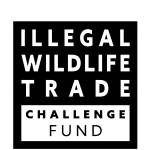Co-designing sustainable management solutions

Representatives from the women’s working group undertaken at Zalala Beach, Mozambique. Credit - Naseeba Sidat, Wildlife Conservation Society.
Engaging fishing communities in co-designing sustainable management solutions for shark and ray populations in Mozambique
Mozambique is a global hotspot for shark and ray species richness, with 130 species identified. The small-scale fisheries sector in Mozambique accounts for more than 75% of marine fishery landings, which places enormous pressure on coastal shark and ray populations. Consequently, more than 50% of shark and ray species in Mozambique are now listed as globally threatened with extinction (i.e., Critically Endangered, Endangered, or Vulnerable) on the International Union for Conservation of Nature Red List of Threatened Species.
Information on sharks and rays recorded at small-scale fisheries landing sites in Mozambique, through surveys conducted by the Wildlife Conservation Society (WCS) and the Oceanographic Institute of Mozambique (InOM), revealed Zalala Beach to be a major contributor to catches of threatened shark and ray species, including juveniles, indicating significant and unsustainable fishing pressure in this area.
"Engaging with the fishing community was a vital aspect of the project, as their input and experience are invaluable in developing practical and sustainable conservation measures that the community supports."
Sharks and rays play essential roles that extend beyond their ecological functions. They provide subsistence and income revenue for thousands of community fishers at Zalala Beach. However, the high dependence on fishing and lack of complementary livelihood options are threatening food security, fishery sustainability, and sustainability of shark and ray populations in this area.
Recognising the urgent need for conservation efforts, WCS and InOM initiated a collaborative project in 2023, in partnership with the University of California, Santa Cruz (UCSC), and with funding from the UK Government through the Illegal Wildlife Trade Challenge Fund.
The primary goal of the project was to engage small-scale fisheries to raise their awareness on the importance of sharks and rays and the impact of their overfishing on the livelihoods of fishers in Zalala Beach, and jointly design potential solutions for sustainable fishing practices to both safeguard the long-term welfare of the community fishers and conserve shark and ray populations.

Engaging with the fishing community was a vital aspect of the project, as their input and experience are invaluable in developing practical and sustainable conservation measures that the community supports. Through this collaborative approach, 25 potential solutions (actions) were noted, with 80% proposed by community members. These solutions were categorised into five broad areas: management measures; livelihoods enhancement (fishing and non-fishing activities); fishing community empowerment; participatory decision-making; and capacity building.
Furthermore, specific recommendations were developed to support the implementation of these potential solutions and enable conservation partners like WCS to work hand in hand with local communities to co-design and implement sustainable fishing practices. This approach is intended to help safeguard the livelihoods of community fishers and ensure that shark and ray populations in Zalala Beach are fished in a sustainable manner. Through this project, WCS has continued to work with local authorities to enhance the participation of Zalala Beach communities in decision-making, responsible management, and ownership of fishing practices. WCS conducted a second field mission to this area in June 2024, which focused on efforts to identify and implement more sustainable fishing practices.
"It is vital to provide time, space, and safety to allow the community to express themselves and explain their needs."
The project activities and outputs significantly enhanced the knowledge and awareness of the importance of sharks and rays and the impact of overfishing on their populations among the fishing communities at Zalala Beach. The project also provided the opportunity for interested parties to engage with each other face-to-face during meetings, fostering a sense of unity, and creating a platform for open discussions and exchange of ideas.
The focus group discussions provided valuable opportunities for representatives of fishers using different gears, traders, and a woman’s group, to voice their needs and ideas. Local government entities and community members are now more knowledgeable about the revised Maritime Fisheries Regulations (REPMAR) approved in 2020, which they previously knew little about. This improved understanding will help local entities with their daily work and avoid misunderstandings when enforcing the regulations on the ground.
Listening and understanding are much-needed skills. Therefore, it is vital to provide time, space, and safety to allow the community to express themselves and explain their needs, even in a broader fisheries context beyond the focal topic of sharks and rays, from which relevant information can be drawn to support project activities.

A key lesson learned from this project was the importance of progressing at a pace and with an approach that facilitates the engagement and involvement of key stakeholders, including communities and government agencies. Keeping them updated and involved throughout the project is crucial for ensuring its long-term impact and sustainability on the ground.
Engaging directly with community members, in safe spaces where they feel comfortable expressing themselves, was very rewarding. Going beyond the ecological dimension of shark and ray conservation and bringing up socioeconomic, food security, and fishing sustainability has made the work more comprehensive and fulfilling for the project team.
The project team felt a deep sense of gratitude towards the community for their active participation and support for the project's approach. Naseeba Sidat shares,
"My faith and perseverance in undertaking a master’s degree enabled me to develop various skills that improved the work I have been doing in the marine conservation field since 2012. The Coastal Science and Policy master’s degree at the University of California, Santa Cruz, transformed my development skills, brought much more attention to social sciences, and leveraged my experience, especially in engaging with interested parties. This made me step out of my comfort zone and enabled me to build blocks for future research opportunities."
Written by Naseeba Sidat, Dr Rhett Bennett and Hugo Costa. For more information on this IWT Challenge Fund Main project IWT116, led by WCS, please click here. For more information on the work conducted by WCS Mozambique, click here.

 Back
Back